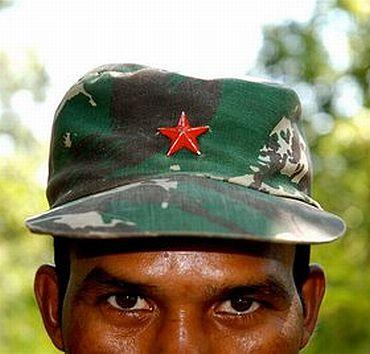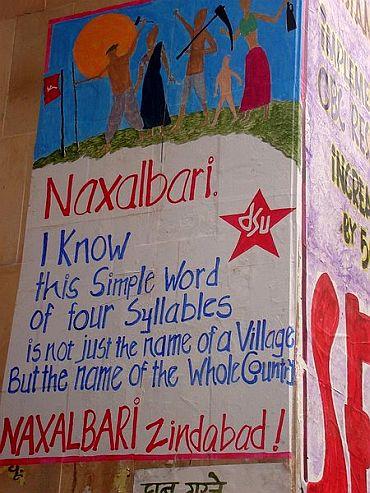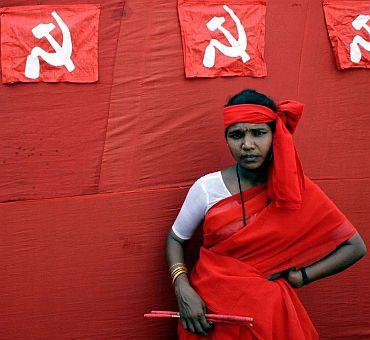Swedish writer Jan Myrdal and Gautam Navlakha, consultative editor, Economic and Political Weekly, travelled into the jungles of the eastern ghats to interview Mupalla Laxman Rao, the Communist Party of India-Maoist general secretary better known as Ganapathy.
In the first of a 4-part series, Ganapathy talked about the birth of revolutionary movement, its struggles and the way it learnt its lessons with passing time.
In Part II of the series, the CPI-Maoist general secretary alleges that the central government has been using the country's army against its own people on the pretext of internal security. He believes that an all-out war will eventually prove detrimental for India's ruling class.
Part I: 'Maoists have traversed through a torturous path'
" For a long time, since Comrade Charu Mazumdar's martyrdom, India lacked a single revolutionary platform. In this particular juncture, the emergence of our party provides new hope to the people.
I want to say that the party has no illusion about the so-called parliamentary system and knows well the Indian State's might. We clearly know our limitations and shortcomings, even after unity (formation of Communist Party of India-Maoist) and the weaknesses of Maoist forces in the country and other countries.
The favourable revolutionary conditions, the widespread bitter class struggle in Indian society and the development of the armed struggle are being keenly observed by the enemy, who is taking it most seriously.
The Indian ruling class is giving no opportunity to these struggles. So immediately in the context of world revolution -- also putting together the experiences of Philippines, Peru, Nepal, and India -- imperialism is most concerned about the development of a bitter class struggle.
In the present situation of world, if the Maoist revolution in India can advance to a new stage, it will become a grave threat to world capitalist system. That is why imperialism, particularly America, has taken these developments seriously.
So, on one side, there are more favourable conditions for revolution, and on the other side there is a full onslaught by the enemy to suppress the revolution. In this situation, our plan is to fully utilise the favourable conditions while resisting the enemy. ...
'An unjust war is being imposed on us'
This war is meant for destroying the revolution, which is gradually emerging as an alternative political power to the existing reactionary political power in the country and plundering massive minerals and other rich natural resources of the vast areas of Adivasi people and other local people from Lalgarh to Surjagarh.
They are imposing this war on those who are against this war -- Maoist revolutionaries, Adivasi and local people of the vast forest areas, workers, peasants, urban middle class, small and medium bourgeoisie, Dalits, women, religious minorities and oppressed nationalities, democratic organisations, progressive and patriotic forces who comprise more than 95 per cent of the population. It is completely an unjust war.
These are real looters, plunderers, corrupters, blackmailers, hoarders, scamsters, murders, conspirators, oppressors, suppressers, autocrats, fascists, most reactionaries and number one traitors. These reactionaries plan to continue this war for a long time till they achieve their goal.
Any Maoist, democrat, progressive, patriot, and people will not accept this unjust war imposed by the rulers. People will completely oppose this unjust, most cruel, inhumane and treacherous war. All our countrymen and people of the world will defy it.
In the history of the class society, people never tolerated any kind of unjust war forever but they fought back every unjust war by paying the price of their own blood and ultimately won it. If we look at the political developments of the country, this inhumane all-out war is giving a tremendous scope to unite vast masses of people and certainly it will become counter productive to the ruling classes.
After August 15, 1947 we never saw such integration of Indian economy, defence, internal security, polity, culture and entire State with the imperialists, particularly with the US imperialists. The nuclear deal and several defence deals, glaring interference after terrorist attacks in Mumbai on November 26, 2008 and Union Home Minister P Chidambaram's visit to the US and crucial agreements related to internal security are some glaring instances.
Due to this significant change, the Indian expansionists are playing a crucial role in the South-Asia. The fundamental contradiction between imperialism and Indian people has further sharpened. It will give great scope to unite people against imperialists and fight back imperialism.
'The army is being used against its own people'
From several decades, Kashmir and Northeast have been under military and paramilitary domination. On the other hand, drastic change has been seen in internal security due to the role of military in internal security.
The Indian army was deployed at the time of historic Telangana armed agrarian revolution (1946-52) and for a short-while (in 1971) in some pockets of West Bengal after great Naxalbari peasant armed uprising of 1966. But today in long-term perspective, the Indian Army is being reorganised.
Under the dictates of global war against terror, three years ago the Indian Army declared its new policy (Doctrine of Sub-conventional Warfare) to deal with internal security and needs of the modern war with other countries. Under this restructured plan, the Indian army is training a large number of its forces according to needs of widespread counter-insurgency operations. The army is being used in a vast area of our country against its own people in the name of internal security.
If it (Indian government) is really a people's government, how can it use its own army against its own people? The Indian State is functioning as an autocratic and fascist rule in the garb of democracy. The fascists are challenging the gains made by revolutionary and democratic people's struggles. But this will also force the vast masses of the people to unite and resist with whatever means to defend.
We must also talk about the current world economic crisis. This crisis is, in certain aspects, even deeper than the great depression of 1930s. But capitalism does not die on its own without a revolution. Now, to come out of this crisis, imperialist will try to increase exploitation of working class and middle class of its own countries and increase plunder of third world countries.
Multinational Corporations (MNCs) and Comprador Bureaucratic Bourgeoisie (CBB) -- the collaborators of imperialists -- concentrated on the large tracts that extended from Lalgarh in Bengal to Surjagarh in Maharashtra. To exploit this rich -- primarily Adivasi (tribal) -- region, state and central governments have signed hundreds of memorandums of understanding.
Indiscriminate loot of this region will destroy the environment and bring long-term ecological changes. The most oppressed community of Indian society, the Adivasis and local people have come under a great threat. Probably for the first time in the world, such a huge population of indigenous people are being threatened.
'We are focussing on urban areas and arming ourselves'
A new situation is being created and with a concrete programme these oppressed sections must advance. It is evident that without the emancipation of these people, we can neither advance nor will the revolution succeed.
People of northeast's oppressed nationalities and Kashmiris have been fighting for their liberation from decades. They have advanced to some extent and faced unprecedented sufferings. While we have had some successes in guerrilla warfare, they (oppressed nationalities) see some hope in the Maoists.
There is a new hope that national liberation struggles will hasten if the Maoist revolution advances. In this context, in accordance with MLM (Marxism Leninism and Maoism), the party always maintained the position of the right to self-determination, including secession of all oppressed nationalities. This has to be utilised to unite with them and form a united front.
For instance, when the Naga forces were deployed in Chhattisgarh or when the Mizo battalions were placed here, there were some protests in Nagaland and Mizoram by the soldiers' family members. They said they opposed the war on people; they did not want to send their children for suppressing other people. Strategically, it is creating a better condition to unite people.
Overall, the enemy has declared an all-out war on the people in the name of internal security, and in the name of danger from Maoists. We are relatively strong in several rural areas. But at present our forces are weak -- we are weak in urban areas, and we are also weak among workers and petty bourgeois. The people's army too is weak and its weapons are inferior to the enemy. These are our weaknesses in general.
To strengthen the people's army and focus on urban areas are some of most important urgent tasks. The Unity Congress of our party has clearly announced a strategic plan and has given enriched documents for improving in these fields.
On the other hand, social contradictions are sharpening very fast. Along with above urgent tasks, our party is concentrating to unite more and more people. If we succeed in this, we can make a leap in the revolution. We are hopeful about the emergence of a united front. We strongly feel that it is not only our task but the task of all revolutionary, democratic and progressive forces.
Also, the contradiction within the enemy classes is sharpening. It could be seen in Nandigram and to some extent during the Lalgarh struggles. We are utilising this contradiction to advance the class struggle.





article